Fish Feed Production Line
The fish feed production line is mainly used for producing fish feed pellets, shrimp feed pellets, and so on. It is suitable for small, medium, and large aquaculture farms. Also, it can be used in various fish feed plants.
Capacity: 0.05-30T/H
The type of fish: tilapia, catfish, eel, milkfish, carp, trout, salmon, turbot, koi, etc.
Finished pellet: 1-12mm
Raw material: fish meal, starch, bone meal, soybean meal, peanut meal, etc.
Application: floating fish feed industry, sinking fish feed industry, etc.

The Main Equipment Of The Fish Feed Production Line
Among the fish feed production line, the most important section is pelletizing section. In producing fish feed pellets, there are two kinds of machines are used. One is the fish feed making machine, another is the fish feed extruder.
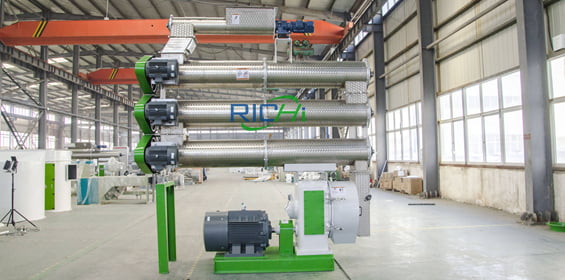
Fish Feed Making Machine
Fish feed making machine is a feed processing machine that takes corn, soybean meal, straw, grass, and rice husk as raw materials and directly presses them into 2-12mm pellets after crushing raw materials. After being made into feed pellets, nutrition is not lost, the surface of pellets is smoother, and the hardness is more suitable for animal digestion.
Floating Fish Feed Extruder machine
The floating fish feed extruder machine is a twin screw extruder, which is mainly used for the production and processing of high-grade aquatic feed pellets and pet feed pellets, including the processing of viscous formula materials. The floating fish feed extruder machine can produce aquatic feeds with different particle sizes and shapes. And these feeds can remain stable in water for a long time, so it can reduce the waste of feed nutrition.
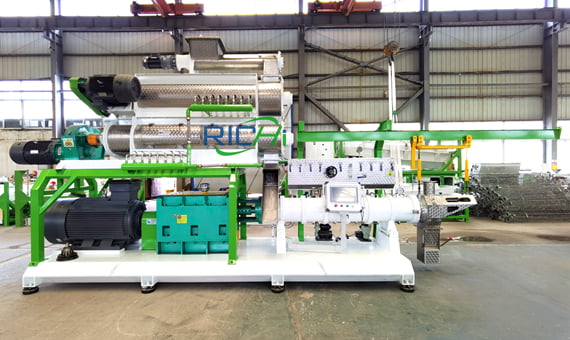
In general, users choose different equipment and corresponding power according to their own production capacity and product types. RICHI Machinery specializes in equipment research and development for more than 25 years. If you want to know more, just send an inquiry to us.
The Working Process Of A Complete Fish Feed Production Line
First Crushing Process
Firstly, the feed grinder machine breaks the raw material into smaller pieces. The purpose of primary crushing is to reduce the particle size difference of the raw materials. And it is convenient for the subsequent process.
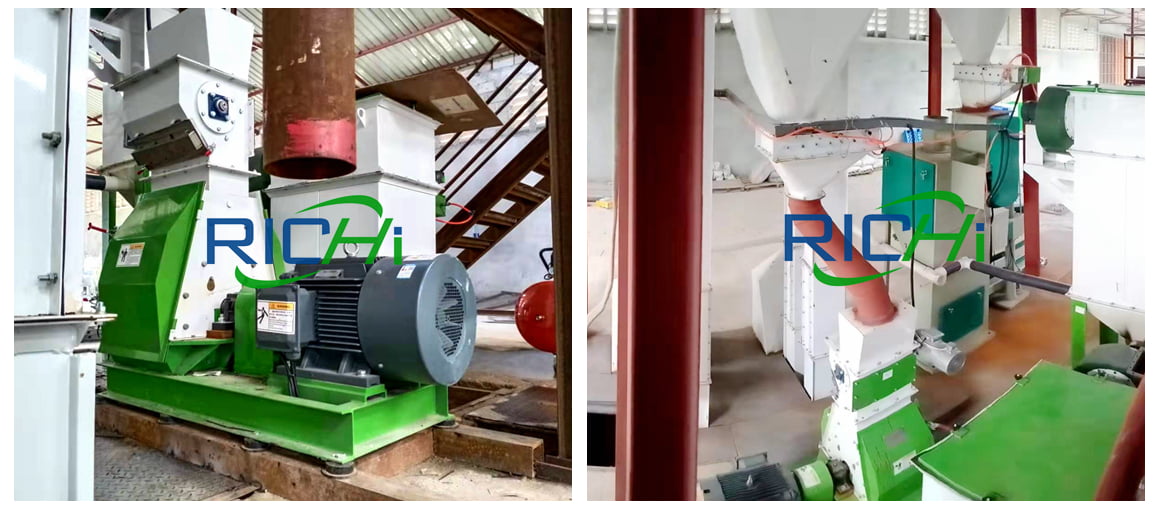
First Batching And Mixing Process
Material batching is designed according to the nutritional needs of different animals, with an accurate weighing of various ingredients. The mixing system is to mix various materials under the action of external force to make the raw materials evenly distributed. Then the finished pellets contain balanced nutrients.

Second Crushing and mixing Process
Due to the low feed intake, short digestive tract and poor digestive capacity of aquatic animals, the granularity of aquatic feed is required to be very fine. Thus, there is a need for secondary crushing.
The crushed raw materials enter the secondary batching and mixing process. In the second mixing section, all materials are fully mixed. At the same time, there is an artificial feeding port above the feed mixer machine. And the port is mainly used for the addition of additives.
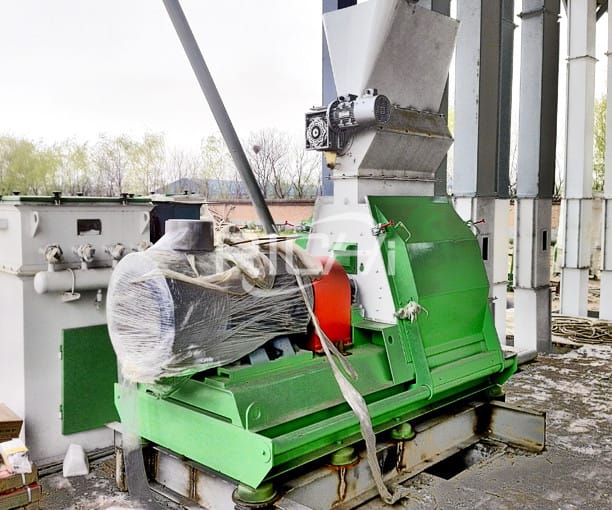
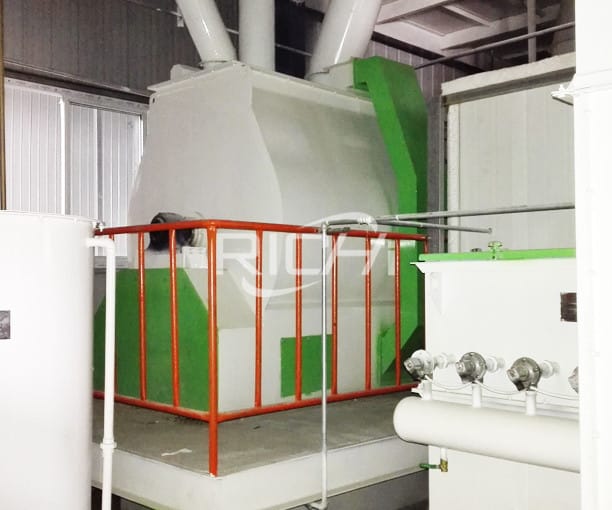
Extrusion Process
The extrusion heating process can kill some pathogenic bacteria and most viruses, thus reducing the level of toxins in feed materials. The fish feed extruder can produce floating and sinking fish feeds according to the feeding characteristics and habits of fish. The fish feed extruder can produce aquatic feeds with different pellet sizes and shapes. And these feeds can remain stable in water for a long time, so it can reduce the waste of feed nutrition.
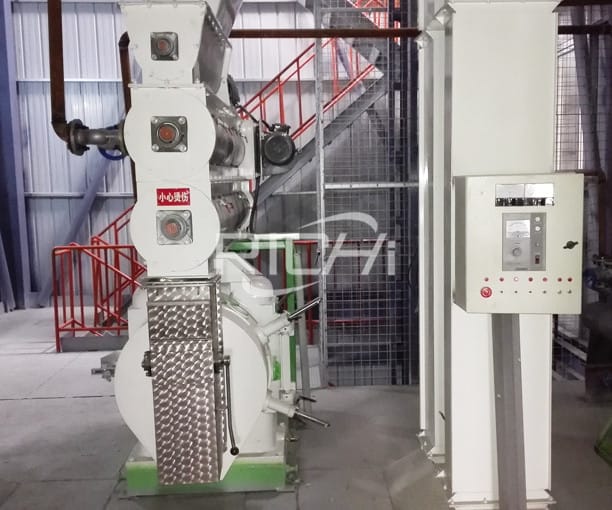
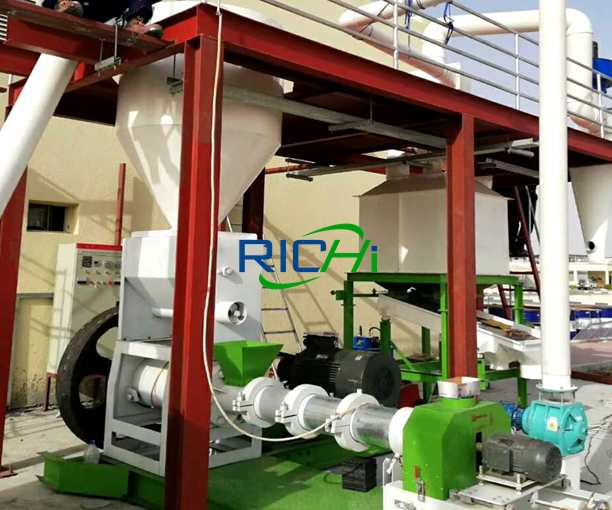
In general, users choose different equipment and corresponding power according to their own production capacity and product types.
Drying Process
After the material is extruded, it forms wet and soft particles (moisture content is 25%-30%). In order to reduce the crushing of pellets, it is advisable to use pneumatic conveying and enter the dryer, so that the moisture of the material is reduced to about 13%.
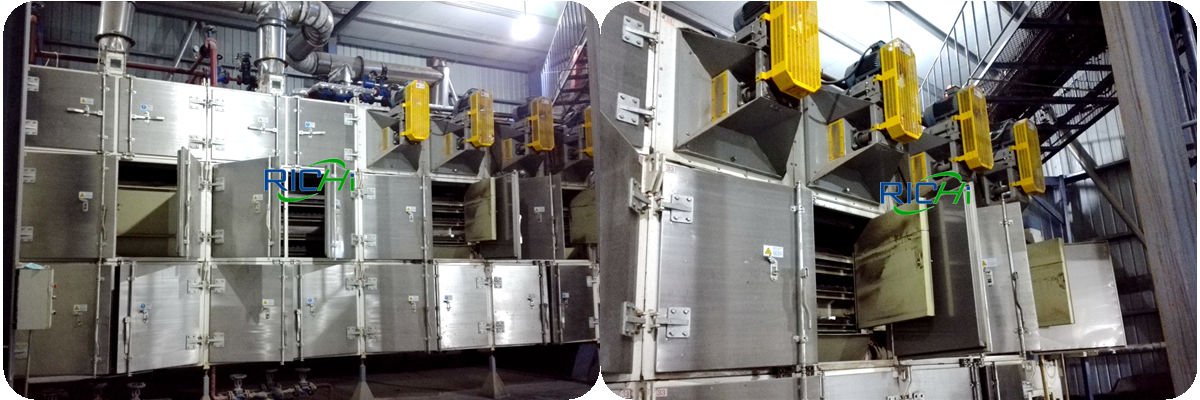
Spraying and cooling Process
After drying, the pellets enter the spraying system. The surface of pellet feed was coated with oil, vitamins and flavoring agents. It can not only meet the energy needs of fish and reduce the loss of heat-sensitive substances in the process but also improve the palatability of feed and reduce the powder content.
After spraying, the temperature of the pellets gets high. At this time, the pellets are easy to break. To avoid loss in this process, the pellets must be cooled. The needed equipment is a counterflow cooler. The particle temperature after cooling is not higher than room temperature by 3-5℃.
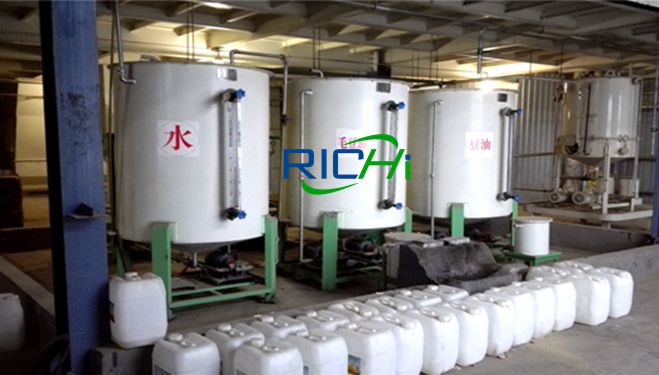
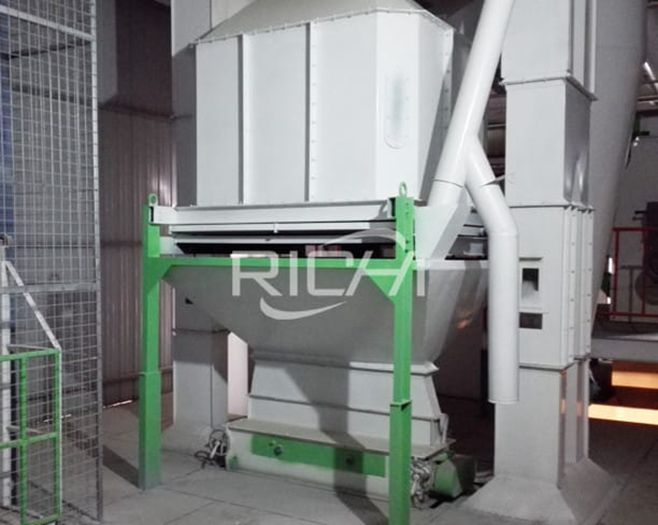
Screening And Packing Process
The cooling pellets should get into the screening system. The qualified pellets directly enter the packing system. While the unqualified pellets shall be crushed or pelletized again.

In general, users choose different equipment and corresponding power according to their own production capacity and product types.
The Cases Of The Fish Feed Production Line
The fish feed production line provided by RICHI Machinery is CE/ISO/BV certificated and sold well all over the world. It is favored by the majority of users. RICHI Machinery has clients from more than 100 countries and regions all over the world. In these regions, we have undertaken the design and building of a fish feed production line. Also, we have technicians to provide clients with professional guidance and maintenance recommendations.
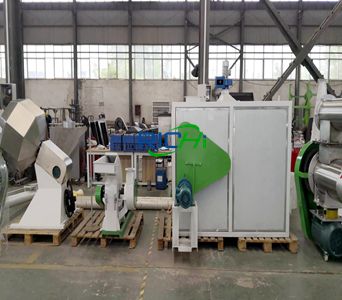
The Fish Feed Processing Line
Country: Nigeria
Capacity: 100-150kg/h
Total power: 50.74kw
Raw material: fish meal, vegetable oil, bone meal, wheat gluten meal, flax meal
Feed pellet: 2-6mm catfish feed pellets
Workshop size: 8m*3.5m*4m (L*W*H)
Operate worker in this line: 2-3 person
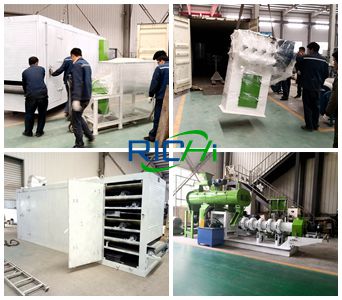
The 300-400KG/H Floating Fish Feed Production Line
Country: Cote d’lvorie
Total power: 90kw
Raw material: fish meal, vegetable oil, bone meal, etc
Feed pellet: 2-12mm fish feed pellets
Workshop size: 10m*3m*7m (L*W*H)
Operate workers in this line: 3-4 person
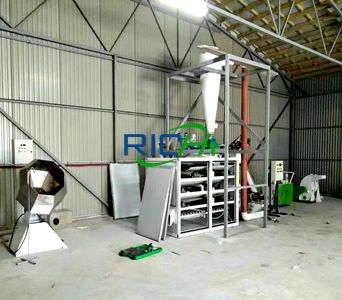
1T/H Fish Feed Production Line
Country: Bolivia
Total power: 115kw
Raw material: fish meal, vegetable oil, cotton meal, premix, etc
Feed pellet size: 2-4mm fish feed pellets
Workshop size about this project: 8m*11m*14m (L*W*H)
Operate worker in this line: 2 person
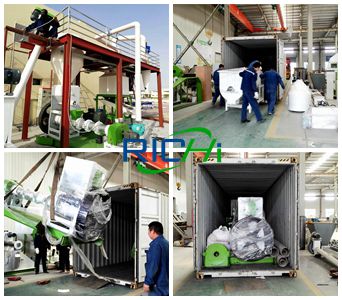
Uzbekistan Fish Feed Plant And Chicken Feed Manufacturing Plant
Capacity: 1-1.5t/h
Total power: 146kw
Raw material: vegetable oil, soybean meal, wheat gluten meal, premix, etc
Feed pellet size: 1mm, 2mm fish feed pellets, and chicken feed pellets
Workshop size: 7.5m*7m*7.7m (L*W*H)
Operate workers in this line: 3-4 person
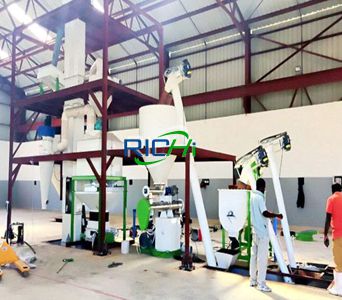
The Fish Feed Production Line
Country: Ecuador
Capacity: 1-2t/h
Total power: 58kw
Raw material: fish meal, bone meal, soybean meal, cotton meal, alcohol master batch, etc
Feed pellet size: 3mm shrimp and fish feed pellet
Workshop size: 9m*6m*13m (L*W*H)
Operate worker in this line: 2 person
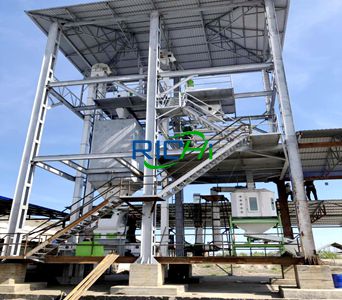
The 5T/H Sinking Fish Feed Production Line
Country: Uzbekistan
Total power: 298kw
Raw material: fish meal, peanut meal, soybean meal, wheat gluten meal, cotton meal, premix, etc
Feed pellet size: 1mm, 2mm pellet
Workshop size: 7.5m*7m*7.7m (L*W*H)
Operate workers in this line: 5-6 person
The Special Technologies Of The Fish Feed Production Line
Optimal Crushing Particle Size Control Technology Of Feed
The feeding animals of specific species and specific feeding stages have the best crushing particle size for the products of specific feed formulas. This powder crushing particle size is the combination of the best crushing particle size of various raw materials. Under this particle size, animals will obtain the maximum digestibility of feed and minimize the nutrients and dry matter discharged from feces. The crushing particle size of special aquatic animal feed has a particularly obvious impact on the digestibility of nutrients and animal production performance. This technology can be realized by a pellet micro crumbler.

Steam Conditioning Technology
Steam conditioning of feed can improve the gelatinization degree of starch, denature protein and improve the digestibility of feed. In addition, conditioning is also conducive to feed granulation, expansion, and maintaining particle durability, reducing feed loss in transportation and water, and improving feed utilization. This can be achieved by a two-layer or three-layer conditioner.
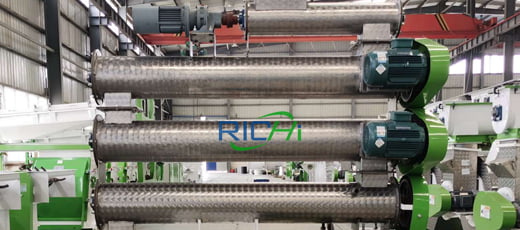
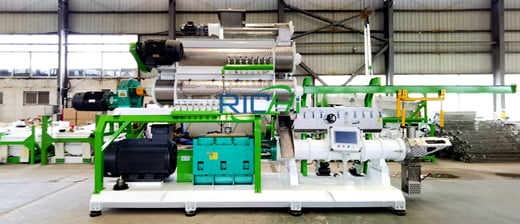
Extrusion Technology
The temperature and pressure conditions of extrusion processing are stronger than granulation and expansion. It is the preferred processing method for aquatic feed and pet feed, which can better improve the digestion and utilization rate of these animal feeds. This can be achieved by a fish feed extruder.
Liquid Adding Technology Of Active Feed Additives
Many vitamins, enzymes, and probiotics are thermally unstable. If additives are added to the mixer, they will lose a lot after conditioning, granulation, and extrusion expansion. The loss of these additives will be greatly reduced by spraying directly on the surface of the pellet feed after granulation and expansion. This can be achieved by a spraying machine.
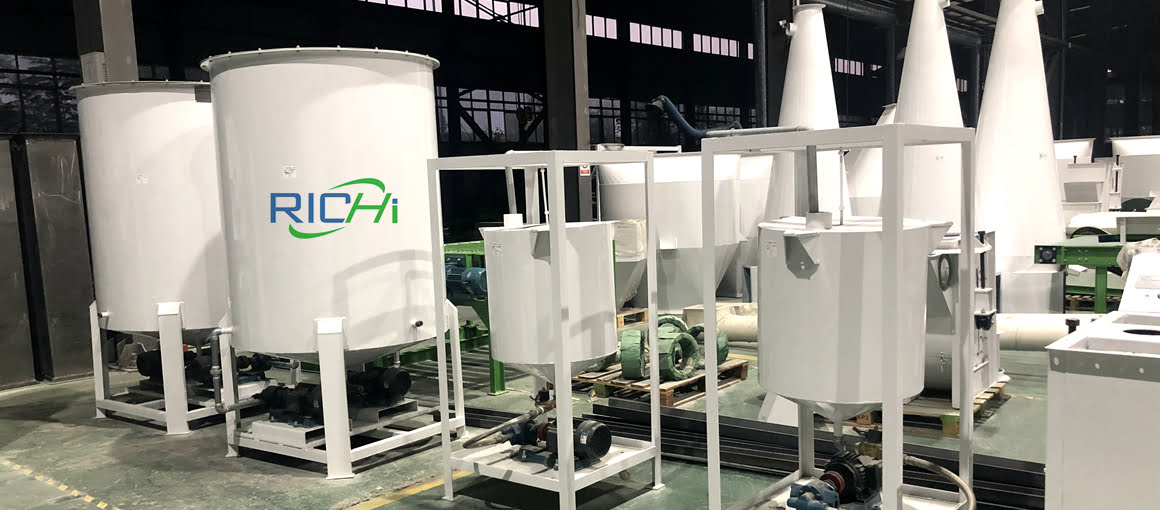
In Richi Machinery, a complete fish feed production line is equipped with the pellet crumbler, shaft paddle mixer, two-layer or three-layer conditioner, fish feed extruder, and spraying machine.
In general, users choose different equipment and corresponding power according to their own production capacity and product types.
How To Choose Equipment For Building A Fish Feed Production Line?
With the rapid development of the aquaculture industry, especially the growing economic benefits of aquaculture, a variety of aquatic feeds such as puffed pellets and hard feed pellets came into being. Therefore, seizing this opportunity to build a fish feed production line is a good way to make a fortune.
As fish have tiny intestines, and poor digestion and absorption, aquatic feed processing technology is far more demanding than the processing of livestock and poultry feed. Therefore, the choice of equipment for the fish feed production line is particularly important.
Selecting appropriate fish feed production equipment, the first thing is to know the characteristics of the fish feed:
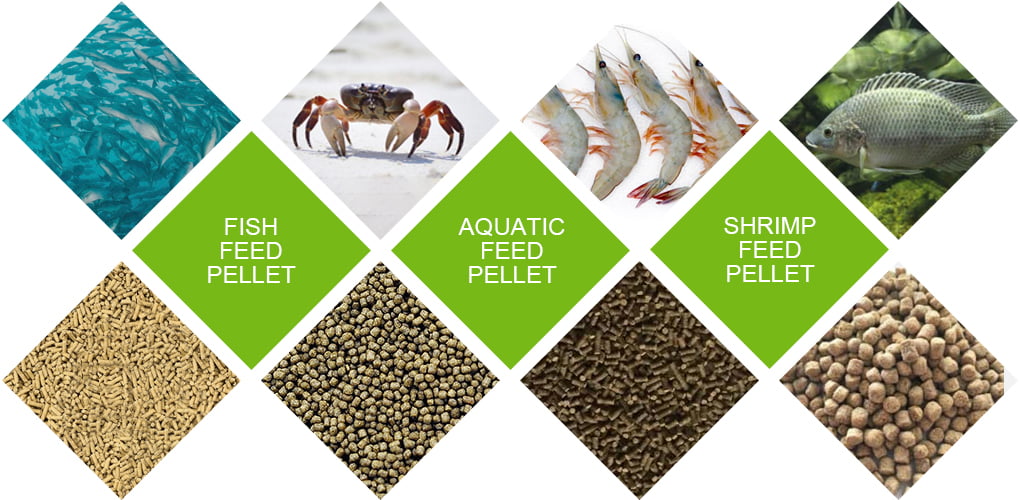
- Small particle size. Due to the short digestive tract of fish and related physiological characteristics, in order to speed up digestion and absorption, fish feed should be smaller than the crushed particle size of livestock and poultry feed. Taking an example, the production of eel and shrimp feed, the particle size should reach 80-120 mesh.
- High protein content and low carbohydrate content. The protein content of livestock feed is generally less than 20%, while most of the protein content of fish feed is 30% to 40%. For example, the protein content of sablefish and eel feed is as high as 65% to 70%.
- The structure of fish feed pellet is tight, with a high degree of adhesion and water resistance.
- In the production of fish feed, cross-contamination is strictly prohibited. So, some raw materials need to be aseptic. The equipment selected is facilitate to clean-up.
In general, users choose different equipment and corresponding power according to their own production capacity and product types.
The production of high-quality fish feed must rely on scientific and reasonable processing technology, and make it combined with advanced, reliable, and stable processing machinery. In this regard, the choice of processing equipment for the fish feed production line is particularly critical.
The selection of crushing equipment
When producing ordinary fish feed, the size of its raw materials is required to be 40-60 mesh. But when producing the special aquatic pellet feed (shrimp feed, eel feed, turtle feed, etc), the size of raw materials must reach more than 80 mesh. To achieve the ideal size of the crushed, the previously used hammer mill is not adapted to the production of fish feed. It must select the micro crumbler to carry out.
RICHI Machinery owns this micro crumbler. The micro crumbler is widely used in the crushing of raw materials of fish feed. The key parts are all imported, and it is easy to operate and maintain.
The selection of the pelletizing equipment
For the production of fish feeds, a high degree of pasting and stability in water is required, so conditioning is essential. In needed moisture and temperature, the only approach to get this is extending the conditioning time. The most common equipment is the multi-layer conditioner before pelleting.
RICHI Machinery can provide you with a fish feed production line with a three-layer conditioner. Inside the conditioner, the raw material is fully contacted with the saturated dry steam, to become mature, pasted, and sterilized.
The selection of equipment for producing floating fish feed
Feed puffing technology is mainly used in the production of special aquatic feed, pet feed, and other animal feed. In addition to the advantages of the general full-price pellet feed, the puffed feed also has the ability to improve the digestive absorption rate of fed animals and can effectively prevent animal digestive tract diseases.
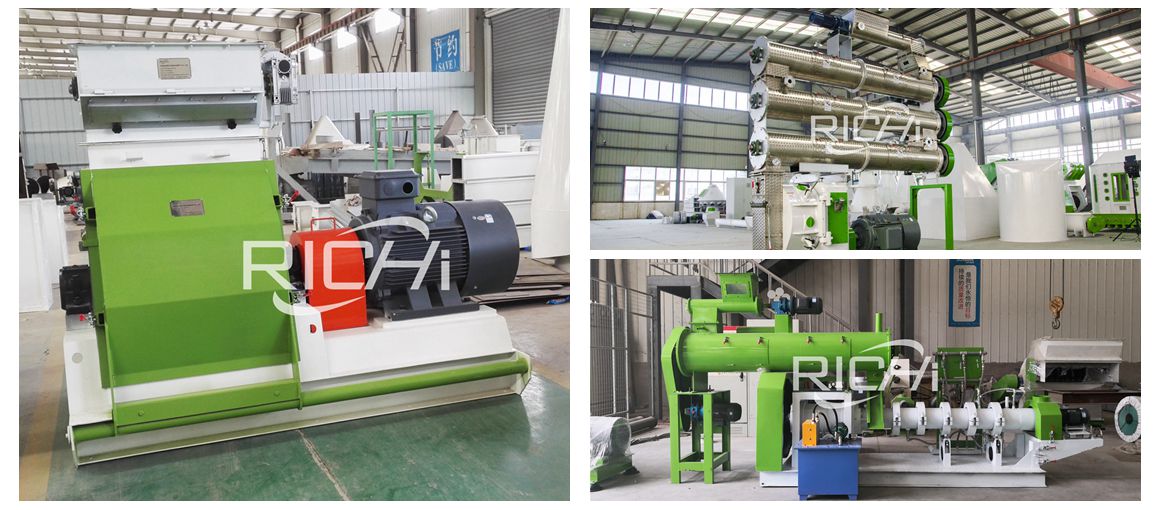
RICHI Machinery can provide you with the equipment with such technology. The fish feed extruder of a complete fish feed production line is suitable for the processing of various floating and sinking aquatic feed, suckling pig feed, pet feed, etc. Quality is the life of an enterprise. To produce fish feeds and obtain high-quality feeds of different species that meet the requirements, one should choose the applicable equipment according to the species they produce. RICHI Machinery has its own factory and professional production equipment. With more than 20 years of experience in the industry, RICHI Machinery can provide customers with different recommendations.
If you are interested in this industry, you can just send an inquiry to RICHI Machinery and we will provide you with professional advice.
In general, users choose different equipment and corresponding power according to their own production capacity and product types.
The Fish Feed Formulas Suitable For The Fish Feed Production Line
If you are a farmer with high nutritional requirements for fish feed, you should choose RICHI products. RICHI Machinery can provide you with targeted formula design to bring practical benefits from feed nutrition, feeding management, and other aspects.
Carp feed formula
- Bran 43%
- fish meal 30%
- soybean cake 15%
- barley 10%
- additives 2
Grass carp feed formula
- Rice bran 40%
- bran 38%
- soybean cake 10%
- fish meal 10%
- yeast powder 2%
Tilapia feed formula
- Rice bran 45%
- soybean cake 35%
- silkworm pupae powder 10%
- secondary powder 8%
- bone meal 1.5%
- salt 0.5%
Black carp feed formula
- Rice straw powder 40%
- silkworm pupa powder 30%
- rapeseed cake powder 10%
- barley powder 20%
In general, users choose different equipment and corresponding power according to their own production capacity and product types.
FAQ of the fish feed production line

How Do You Start A Fish Feed Factory?
With the development of the fish breeding industry, more and more people enter the fish feed industry. In recent years, global fishery and aquaculture have developed rapidly, and the scale of various freshwater and mariculture farms has become larger and larger. There are many kinds of fish feed purchased in the market, but most of them have single nutrition and mixed quality, which simply can not meet the daily growth needs of special fish and seafood. So how solving the nutrient content of fish feed has become a headache for farmers. They all want to build a fish feed factory. But what should be paid attention to when starting a fish feed factory?
The fully automatic fish feed production line developed by RICHI Machinery according to this situation can adjust the formula according to the aquaculture products. By adjusting the proportion of raw materials in the formula, the protein, vitamin, and fat content required by aquatic products can be reached.

The fish feed machine production line is a kind of fish feed equipment that practitioners in various fishery and aquaculture industries want to know about. As the equipment specialized in producing floating fish feed, suspended fish feed, and other products, whether it can meet the expansion degree required by fish feed is the standard that can reflect the performance of the equipment.
The full-automatic fish feed production line produced by RICHI Machinery is a professional floating fish feed production line equipment developed by our company according to the market demand. The equipment has the advantages of low energy consumption, large output, labor saving, simple operation, and so on. It is suitable for the majority of aquaculture entrepreneurs to invest in and use.

How To Choose Fish Feed Manufacturing Machinery?
With the rapid development of aquaculture, especially the proportion of aquaculture with good economic benefits is increasing and the number of aquaculture varieties is increasing. A variety of aquatic feeds based on hard pellet feed, and floating water expanded pellet feed came into being. Therefore, it is a good way to start an aquatic feed processing plant at this time.
Because the intestines and stomachs of aquatic animals such as fish and shrimp are small and their digestion and absorption capacity is poor, the processing technology of aquatic feed is much higher than that of livestock and poultry feed. Therefore, it is particularly important to select the production equipment for aquatic feed.
To select the production equipment for aquatic feed, we must first understand the characteristics of aquatic feed:
- Small particle size. Due to the short digestive tract and related physiological characteristics of aquatic animals, in order to speed up digestion and absorption, the crushing particle size of aquatic feed should be smaller than that of livestock feed. For example, the particle size of eel and shrimp feed should reach 80-120 mesh.
- High protein content and low carbohydrate content. The protein content of livestock and poultry feed is generally less than 20%, while the protein content of aquatic animal feed is mostly 30%-40%.
- The pellet feed has a compact structure, high cohesiveness, and water resistance. The stability of the pellet feed in water is required to be more than 2 hours.
- Cross-contamination is strictly prohibited in aquatic feed production. Some raw materials need aseptic treatment. In particular, when producing shrimp and eel feed, other kinds of feed shall not be produced at the same time to prevent cross-contamination.
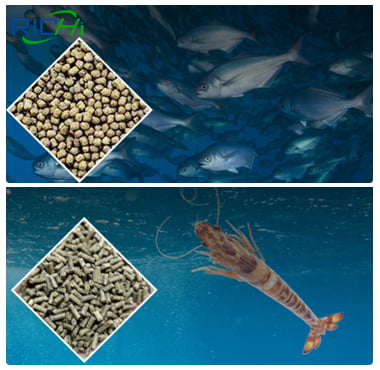
To produce high-quality aquatic feed, we must rely on scientific and reasonable processing technology and combine it with advanced, reliable, and stable processing machinery. In this regard, the selection of processing equipment is particularly critical.
RICHI Machinery is a brand with more than 20 years of experience. RICHI Machinery has its own factory and professional production equipment. It is an industrial group that mainly focuses on feed pellet machinery, and also involves biomass pellet energy machinery, organic fertilizer pellet machinery, and parts.
RICHI Machinery has a perfect sales system and a complete service network, and our products are imported to more than 109 countries and regions overseas. From the beginning of the project to the whole process of the pellet production line, our team of experts is ready to help you with your project and provide high-quality service and technical support. During the service process, we pay close attention to and meet the reasonable requirements of our customers to get them out of trouble.
In general, users choose different equipment and corresponding power according to their own production capacity and product types.

What Is Fish Feed Pellet Machine?
The most commonly used fish feed pellet machine in the production of aquatic animal pellet feed is the feed pellet extruder which can produce expanded fish pellet feed.

By using different types of screws to control the density of finished fish pellets, the fish feed pellet extruder can produce floating and sinking fish feeds according to the feeding characteristics and habits of fish. The expansion heating process can kill some pathogenic bacteria and most viruses, thus reducing the level of toxins in feed materials.
The fish feed pellet extruder can produce aquatic feeds with different particle sizes and shapes. And these feeds can remain stable in water for a long time, so it can reduce the waste of feed nutrition. The fish feed extruder can produce aquatic animal feed that is more resistant to mechanical damage, thus reducing the amount of fine powder produced during transportation.
Recently, more and more people are using the fish feed pellet machine. If you have the intention, please contact us.
In general, users choose different equipment and corresponding power according to their own production capacity and product types.

What Are Benefits For Starting Fish Farming Business?
Due to feed industrialization, global feed production has entered a new stage, and the global feed output has been rising. More and more people want to start a fish feed business and fish farming business. At this time, the use of fish feed equipment is reflected. What are the benefits of producing fish feed yourself?
When making self-made feed, we can take measures according to time, local conditions, and local materials. Make full use of self-produced feed or local feed with high nutrient content, low price, and guaranteed source. Try to save freight and labor costs and reduce feed costs.
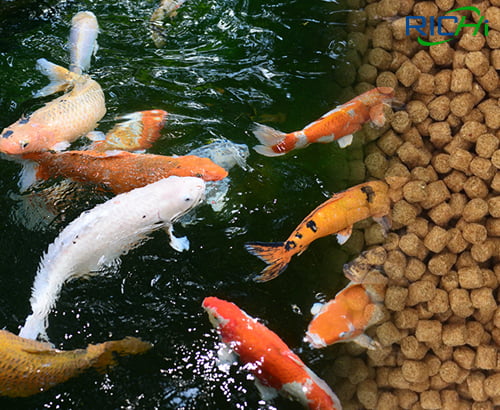
At present, the full-price feed of most cultured fish is hard granular, so it is inconvenient to add some additives or disease-prevention drugs in the process of use. When making self-made feed, various feed additives and disease prevention drugs can be added in time according to the needs of cultured fish, so as to further improve the feed quality, improve the feed conversion rate and strengthen the prevention and treatment of fish diseases.
In different regions, different farmers have different stocking modes, and there are great differences in the required feed nutrition levels. However, the full-price feed produced by most manufacturers mostly designs the feed formula according to the nutritional needs of the main fish, and rarely considers the nutritional needs of the captive fish. The use of self-made feed can be based on the breeding mode and the stocking conditions of different species of fish, Taking into account the nutritional needs of the main fish and the captive fish, the appropriate feed formula is designed to meet the nutritional needs of the fish.
With the growth of cultured fish, their nutritional needs are also changing. Therefore, it is also required to adjust the nutritional level of feed. Only in this way can we not only meet the growing needs of fish at all stages but also effectively reduce the feed cost.
So, the fish feed production line is useful. The fully automatic fish feed production line developed by RICHI Machinery according to this situation can adjust the formula according to the aquaculture products.
CONTACT US
—— GET A QUOTE ——
Pls Send Your Contact Information And Project Requirements, We Will Let Our Project Counselor Contact With You. In Addition, We Will Send The Quotation, Video, And Other Detail Information To Your Email, Pls Remember To Check Your Email!
Address
Longhai 2nd Rd & 10th St, Kaifeng City, Henan Province, China
Mail Address
enquiry@richipelletmill.com
Fax: 0086-371-63752859
Our Numbers
Whatsapp:+8618574103366
Telephone:0086-185-74103366
Open Hours
24 hours at your service Customize your private production
